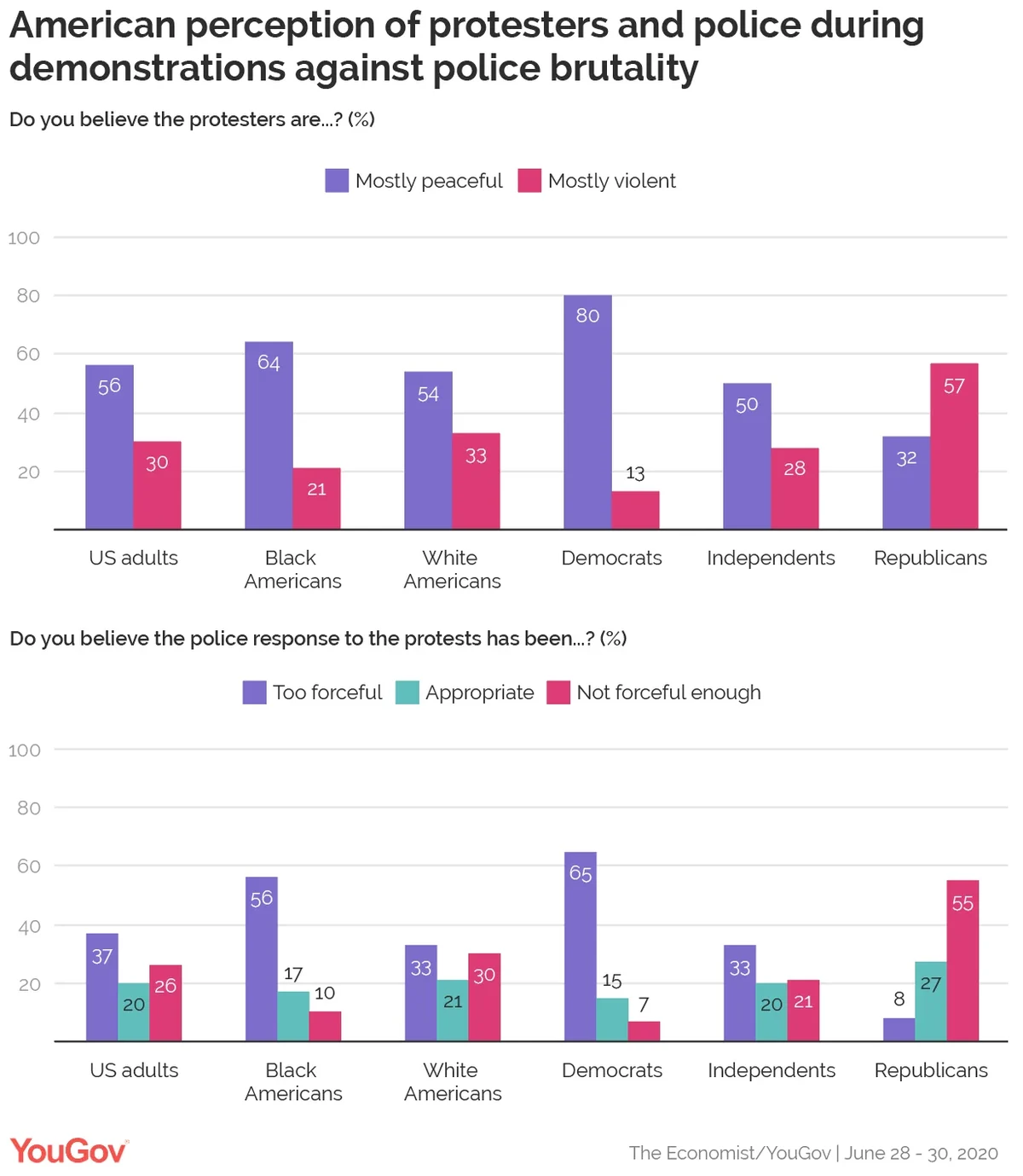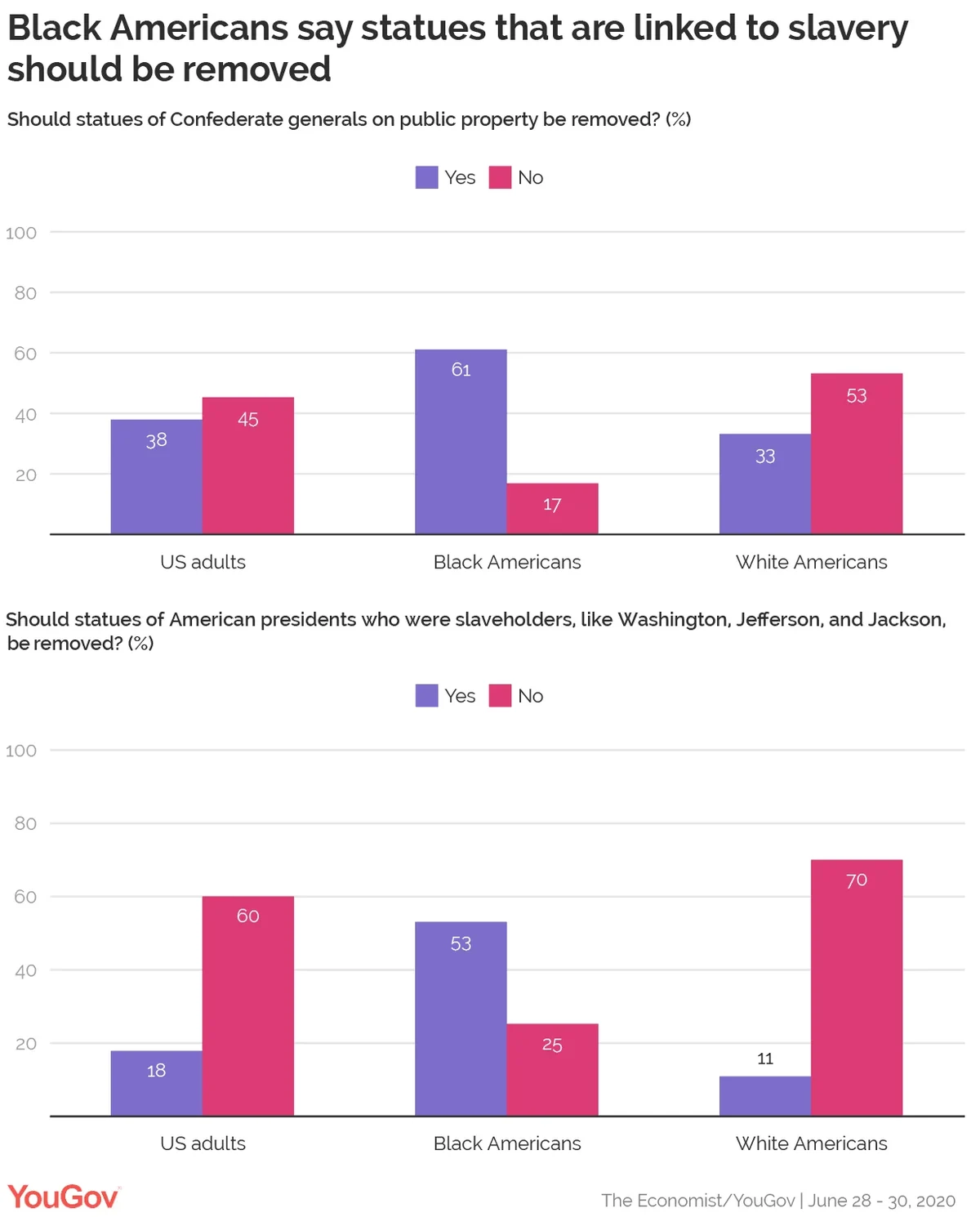After the death of George Floyd in the custody of the Minneapolis police, American appeared to come together in support of the protests that followed. But in the last week, a partisan division on the protests and the police response has emerged—and widened. The latest Economist/YouGov Poll finds that majorities of Republicans now believe most protesters are violent (57%; up 11 points from June 21-23, 2020), and police have not used enough force to control them (55%; up 13 points from June 21-23, 2020).
Other groups changed little in their perceptions of the protesters and the police. President Donald Trump has been actively criticizing the protests on Twitter throughout June, with some of those tweets receiving warning labels from Twitter. Republican characterization of the demonstrators has also changed through the month.

As for the President, Americans overall disapprove of how he is handling the protests: 34 percent approve, but 53 percent disapprove.
Americans of both parties recognize Black and white Americans do not get equal treatment from police nationally—but they’re divide when it comes to their local communities. By 47 percent to 32 percent, white Americans believe there is equal treatment where they live; Black Americans disagree 67 percent to 13 percent. Both Black and white Americans are optimistic that the protests will lead to both police reform and an improvement in race relations (which Americans describe as “bad,” by two to one).
However, while Americans may be optimistic, it’s not by a wide margin. The margin is especially narrow among Black Americans. Civil rights and civil liberties have risen in importance for Black Americans in the poll: it ranks second behind only health care as the nation’s most important issue today among that group.
The protests now have morphed into calls to dismantle statues of the Confederacy, but for many Americans that may be a step too far. A plurality, including most whites and nearly all Republicans, view those statues as symbols of Southern pride and not of racism. White Americans say this by nearly two to one, 55 percent to 29 percent. Republicans believe this by 85 percent to 7 percent.
Consequently, there is limited support (38%) for removing those statues, and even less support (18%) for removing statues of slave owning Presidents. Majorities of Black Americans would remove both types of statues.
Republicans overwhelmingly oppose taking down the statues. Only nine percent support removing the statues of Confederate generals and even fewer (3%) would remove the statues of presidents who owned slaves.

But when it comes to the Confederate Battle Flag, the responses are different. Mississippi was the last state to include the battle flag as part of its state flag. The Magnolia State’s Legislature voted to remove the emblem while this week’s poll was in the field, and Republican Governor Tate Reeves immediately signed it into law. The flag was lowered, and a new flag will be designed that includes the words “In God We Trust.” This is a change that Americans support, though white Americans are relatively closely divided. But as with the questions about removing statues, Republicans disagree. Six in 10 Republicans (60%) oppose removing the Battle Flag from state flags and just 24 percent support it.
{{ raw_content }}
New York City’s Museum of National History will take down a statue of President Theodore Roosevelt which has been the subject of criticism for decades. Roosevelt is astride a horse, with two figures, a Native American and an African, walking beside him. Americans in the poll were shown a picture of the statue. By 50 percent to 32 percent, they said they do not approve of the decision to remove the statue. Black Americans say they approve of the decision by 43 percent to 31 percent.
See the full toplines and crosstabs from the latest Economist/YouGov poll
Methodology: The Economist survey was conducted by YouGov using a nationally representative sample of 1,500 US adult citizens interviewed online between June 28 - 30, 2020. This sample was weighted according to gender, age, race, and education based on the American Community Survey, conducted by the US Bureau of the Census, as well as 2016 Presidential vote, registration status, geographic region, and news interest. Respondents were selected from YouGov’s opt-in panel to be representative of all US citizens. The margin of error is approximately 3.3% for the overall sample.
Image: Getty









